
VOCATIONAL SCHOOL
Department of Radio and Tv Programming (Turkish)
RTV 235 | Course Introduction and Application Information
| Course Name |
Creative Authorship
|
|
Code
|
Semester
|
Theory
(hour/week) |
Application/Lab
(hour/week) |
Local Credits
|
ECTS
|
|
RTV 235
|
Fall/Spring
|
3
|
0
|
3
|
3
|
| Prerequisites |
None
|
|||||
| Course Language |
Turkish
|
|||||
| Course Type |
Elective
|
|||||
| Course Level |
-
|
|||||
| Mode of Delivery | - | |||||
| Teaching Methods and Techniques of the Course | DiscussionGroup WorkQ&ACritical feedbackLecture / Presentation | |||||
| Course Coordinator | - | |||||
| Course Lecturer(s) | ||||||
| Assistant(s) | - | |||||
| Course Objectives | n this course, it’s aim to teach students how to be a good storyteller, how to influence and persuade people by writing. |
| Learning Outcomes |
The students who succeeded in this course;
|
| Course Description | This course includes the techniques of storytelling, the place of the story in persuasion, the effect of art and writing in branding by having a command of the language. |
|
|
Core Courses | |
| Major Area Courses | ||
| Supportive Courses | ||
| Media and Management Skills Courses |
X
|
|
| Transferable Skill Courses |
WEEKLY SUBJECTS AND RELATED PREPARATION STUDIES
| Week | Subjects | Related Preparation |
| 1 | Why do we need stories? How does humanity's story inspire us? Psychological effects of writing. | |
| 2 | Recognition of fiction, information about the genre of novel, short story and essay, good examples, classics and best writers. | Gürsel Korat- Kurmacanın Yapısı- ISBN 9786051858678 Page: 68-76 |
| 3 | What is the meaning of the Hero's Journey? Who is the hero, how is he/she created? Who is the narrator? | Gürsel Korat- Kurmacanın Yapısı- ISBN 9786051858678 Page: 77-90 |
| 4 | Recognizing the stages of fiction, how to create person, time and place? | Gürsel Korat- ISBN 9786051858678 Page: 115-125 |
| 5 | Creative writing essays | |
| 6 | How is the plot constructed and how conflict elements are created? | Gürsel Korat- Kurmacanın Yapısı- ISBN 9786051858678 Page: 90-100 |
| 7 | Creative writing essays using space, time, narrator | |
| 8 | Midterm | |
| 9 | Surreal stories and their importance and difference in storytelling (Fantasy, magical realism, science fiction, fairy tale) | Gürsel Korat- Kurmacanın Yapısı- ISBN 9786051858678 Page: 125-130 |
| 10 | The power of atmosphere creation and dialogue in the story. Credibility and persuasion | Gürsel Korat- Kurmacanın Yapısı- ISBN 9786051858678 Page: 130-141 |
| 11 | Biography and autobiography writing and its good examples | Gürsel Korat- Kurmacanın Yapısı- ISBN 9786051858678 Page: 9-15 |
| 12 | Essay type and good examples | |
| 13 | Creative writing practices, style development with cross-genre essays | Gürsel Korat- Kurmacanın Yapısı- ISBN 9786051858678 Page: 145-150 |
| 14 | The most important elements of dramatic fiction, the last tips on good writing, the latest information on publishing world dynamics | |
| 15 | Review of the semester | |
| 16 | Final Exam |
| Course Notes/Textbooks | Korat, Gürsel - Kurmacanın Yapısı, Everest Yayınları, İstanbul. ISBN 9786051858678 |
| Suggested Readings/Materials | Gülşah Elikbank, Yalancılar ve Sevgililer, Kırmızı Kedi Yayınevi, İstanbul. ISBN 9786059799508 Ayşe Kulin, Füreya, Everest Yayınları, ISBN 9786051851839 Albert Camus, Düşüş, Can Yayınları, İstanbul.ISBN 9789750748745 Kafka, Dönüşüm, İş Bankası Yayınları, İstanbul. ISBN 9786053609322 |
EVALUATION SYSTEM
| Semester Activities | Number | Weigthing |
| Participation |
1
|
20
|
| Laboratory / Application | ||
| Field Work | ||
| Quizzes / Studio Critiques |
1
|
20
|
| Portfolio | ||
| Homework / Assignments | ||
| Presentation / Jury |
1
|
10
|
| Project | ||
| Seminar / Workshop | ||
| Oral Exams | ||
| Midterm |
1
|
20
|
| Final Exam |
30
|
|
| Total |
| Weighting of Semester Activities on the Final Grade |
4
|
70
|
| Weighting of End-of-Semester Activities on the Final Grade |
1
|
30
|
| Total |
ECTS / WORKLOAD TABLE
| Semester Activities | Number | Duration (Hours) | Workload |
|---|---|---|---|
| Theoretical Course Hours (Including exam week: 16 x total hours) |
16
|
3
|
48
|
| Laboratory / Application Hours (Including exam week: '.16.' x total hours) |
16
|
0
|
|
| Study Hours Out of Class |
0
|
||
| Field Work |
0
|
||
| Quizzes / Studio Critiques |
1
|
8
|
8
|
| Portfolio |
0
|
||
| Homework / Assignments |
0
|
||
| Presentation / Jury |
1
|
5
|
5
|
| Project |
0
|
||
| Seminar / Workshop |
0
|
||
| Oral Exam |
0
|
||
| Midterms |
1
|
13
|
13
|
| Final Exam |
16
|
0
|
|
| Total |
74
|
COURSE LEARNING OUTCOMES AND PROGRAM QUALIFICATIONS RELATIONSHIP
|
#
|
Program Competencies/Outcomes |
* Contribution Level
|
||||
|
1
|
2
|
3
|
4
|
5
|
||
| 1 | To be able to define the historical development process, fundamental principles, and theories of Radio and Television Programming, and explain the basic principles of audio-visual storytelling. |
|||||
| 2 | To be able to utilize technical equipment and software requiring expertise in the field of Radio and Television Programming according to contemporary techniques. |
|||||
| 3 | To be able to describe the pre-production research of an audio-visual work, scriptwriting, production planning, camera usage, sound recording, lighting setup, and post-production editing design at a fundamental level and apply at least one of them at an advanced level. |
X | ||||
| 4 | To be able to apply standard video shooting and sound recording indoors and outdoors within the scope of a production in teamwork. |
|||||
| 5 | To be able to explain the national and universal values, professional and ethical principles, and legal regulations required in radio-television broadcasting. |
|||||
| 6 | To be able to evaluate audio-visual outputs based on technical and methodological criticism. |
|||||
| 7 | To be able to generate creative and critical approaches and projects suitable for the broadcasting platform and selected media, taking responsibility in individual or teamwork. |
X | ||||
| 8 | To be able to consider occupational safety principles while working in media, production, and press-broadcasting fields. |
|||||
| 9 | To be able to apply the knowledge gained in classes within the scope of an internship in relevant job fields. |
X | ||||
| 10 | To be able to follow the information in the field and communicate with colleagues by using English at the general level of European Language Portfolio A2. |
|||||
| 11 | To be able to possess interdisciplinary knowledge in artistic, cultural, and social issues related to communication fields and programs. |
X | ||||
| 12 | To be able to direct their learning towards an advanced educational level by keeping track of technological changes and innovations, considering a lifelong learning vision. |
|||||
| 13 | To be able to analyze the universal and social dimensions and legal consequences of their professional work in the field concerning human rights, cultural diversity, environmental issues, public interest, and public service. |
|||||
*1 Lowest, 2 Low, 3 Average, 4 High, 5 Highest
NEWS |ALL NEWS
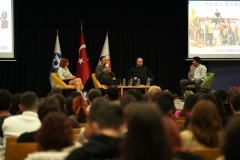
‘Mortal World 2’ actors at IUE
Sarp Apak and Ahmet Mümtaz Taylan, the actors of the film ‘Ölümlü Dünya 2’ (Mortal World 2), which has garnered significant attention
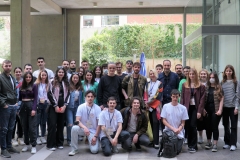
500 students met at the 'festival'
Izmir University of Economics (IUE) Vocational School held one of the biggest design and creativity festivals in the city. 500 students participating
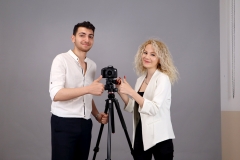
PA’s to the world-famous program from IUE
Hilal Yapıcıoğlu and Doğukan Sözen, students of Izmir University of Economics (IUE) Radio and Television Programming, worked as 'production assistants' in the
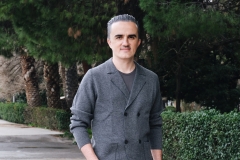
Turkish photography will be promoted in Italy
IUE Lecturer Emre Küheylan was invited as a curator and speaker to the world-famous photography festival called 'Photolux' to be held in

'Turkish coffee' and 'fortune telling' became a documentary
'Turkish coffee', which has become one of the indispensable values of our culture, inherited from centuries ago, and 'coffee fortune-telling', which many
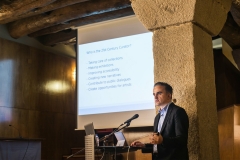
The first Turkish person in the giant jury
Emre Küheylan, Lecturer at Izmir University of Economics (IUE), who has works that made a difference in photography, whose works are exhibited
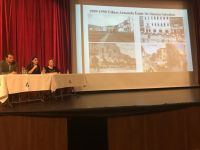
IZMIR CINEMAS WILL REVIVE
Film industry has been addressed at the “Revive Cinema in Izmir Again!” themed panel that took place on Thursday, December 20 at

